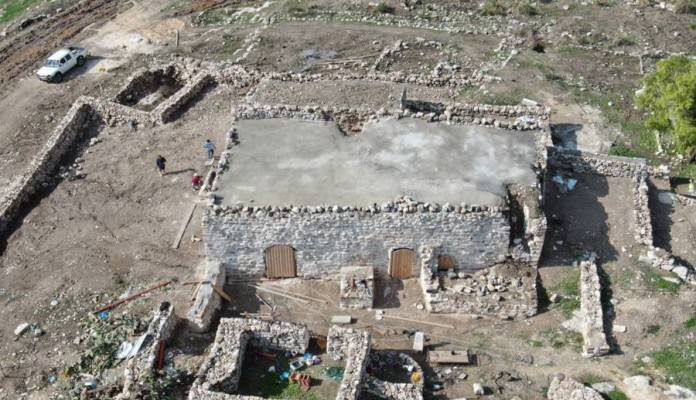About two and a half months ago, a Palestinian Arab invaded the site in Samaria and moved into one of the buildings with his family while carrying out construction work and damaging ancient finds.
By Aryeh Savir, TPS
A Palestinian Arab family has invaded an archeological site in northern Samaria and turned it into its residence, the Regavim movement reported, demanding that the IDF’s Civil Administration act immediately to remove the squatters.
The archeological site, situated near the town of Hermesh in northern Samaria, is a declared archeological site called Hirbat Parsin, which preserves the biblical name Parash, descendants of the tribe of Menashe, and the Talmudic name Kfar Parshai.
The site contains the remains of a large settlement that existed almost continuously from the Iron Age to the Ottoman period.
Among the remains are ritual baths that were hewn in the days of the Second Temple used until the Byzantine period, burial caves, an oil press, underground systems, and impressive structures from the Ottoman period.
This important site has recently joined a series of archeological sites suffering from damage and destruction. Parash has never been excavated by archaeologists but it has been thoroughly and aggressively excavated by local Arab looters and grave-robbers.
About two and a half months ago, a Palestinian Arab invaded the site and moved into one of the buildings with his family while carrying out construction work and damaging ancient finds.
The Regavim movement, which fights illegal land grabs by Arabs, appealed to the Civil Administration to remove the intruder and stop the illegal work at the site. The Administration told Regavim that it had dispatched personnel to the site and served the invader a cease-and-desist order to “stop the destruction of antiquities.”
The invaders remained in the area and continued to damage the antiquities at the site, and Regavim again appealed for immediate enforcement. Administrative inspectors arrived at the scene and confiscated some of the construction equipment and trees planted in the area, but did not evacuate the intruder and his family.
“It is not enough to post an order on the wall and walk away. Someone needs to ensure that the order is actually enforced,” said Eitan Melet, coordinator of Judea and Samaria in the Regavim movement.
“We welcome the initial enforcement steps that have been taken at the site, but there’s a long way to go on the road to restoring the rule of law and re-establishing deterrence. The squatters must be removed from the compound immediately, and prosecuted to the full extent of the law in order to convey a message to other criminals,” he added.
The phenomenon of antiquity destruction in Judea and Samaria is pervasive and affects all sites that are not under permanent preservation. A survey of the sites in Judea and Samaria shows that a staggering 95% of the archeological sites have been robbed, vandalized or disturbed.
